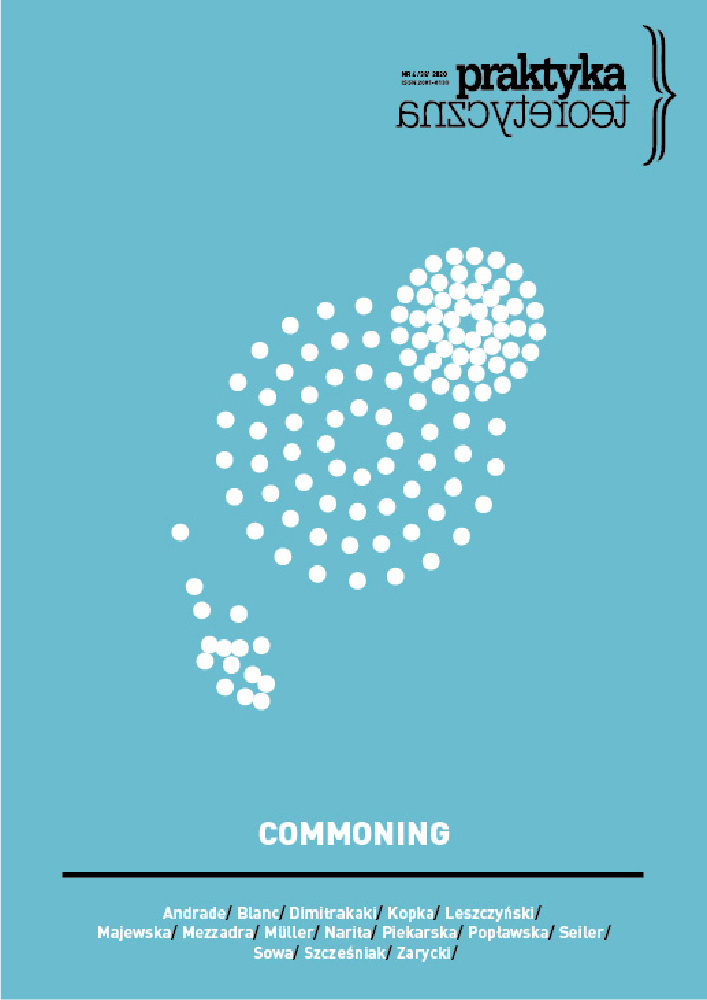Abstract
In this article, I focus on the function of the notions of precariousness, vulnerability, and grievability of life in Judith Butler’s writings, and reflect upon their place in a broader context of the thought of what I call, following Jacques Derrida, “originary mourning.” On the one hand, therefore, I want to reconstruct Butler’s task of rethinking the possibi-lity of creating a community based on the equal allocation of precariousness and grievability. Such a reflection allows Butler to treat grievability as an insightful and unique passageway to the problematics of safeguarding of life and equality between living beings. On the other hand, by referring to the writings of Jacques Derrida, I want to inscribe Butler’s notions of precariousness and grievability in a broader framework of mourning, to show how every constitution of a social bond based on the principle of shared precariousness and vulnerability inevitably has to come up against the paradox of its genesis.
Funding
This work is supported by the National Science Centre in Poland, research project no. 2014/13/N/HS1/00816, title: “The Ethics and Politics of Mourning in the Philosophy of Jacques Derrida.”
References
Blanchot, Maurice. 2003. The Infinite Conversation. Trans. Susan Hanson. Minneapolis, London: University of Minnesota Press.
Butler, Judith. 2000. Antigone’s Claim: Kinship Between Life and Death. New York, Chichester: Columbia University Press.
Butler, Judith. 2004. Precarious Life. The Powers of Mourning and Violence. London, New York: Verso.
Butler, Judith. 2009. “Finishing, Starting”. In Derrida and the Time of the Political. Eds. Pheng Cheah, Suzanne Guerlac. Durham, London: Duke University Press.
Butler, Judith. 2016. Frames of War. When Life Is Grievable?. London, New York: Verso.
Butler, Judith. 2020. The Force of Non-Violence. London, New York: Verso.
Butler, Judith and Athanasiou, Athena. 2013. Dispossession: The Performative in the Political. Cambridge, Malden: Polity Press.
Chomsky, Noam. 2001. Propaganda and the Public Mind. Chicago: Haymarket Books.
Derrida, Jacques. 1984. Margins of Philosophy. Trans. Alan Bass. Chicago: The University of Chicago Press.
Derrida, Jacques. 1993. Aporias. Trans. Thomas Dutoit. Stanford: Stanford University Press.
Derrida, Jacques. 2001a. By Force of Mourning. Trans. Pascale-Anne Brault, Michael Naas. In The Work of Mourning. Eds. Pascale-Anne Brault, Michael Naas. Chicago, London: The University of Chicago Press.
Derrida, Jacques. 2001b. Lyotard and Us. Trans. Boris Belay. In The Work of Mourning. Eds. Pascale-Anne Brault, Michael Naas. Chicago, London: The University of Chicago Press.
Derrida, Jacques. 2005a. Paper Machine. Trans. Rachel Bowlby. Stanford: Stanford University Press.
Derrida, Jacques. 2005b. The Politics of Friendship. Trans. George Collins. London, New York: Verso.
Derrida, Jacques. 2005c. Rogues. Two Essays on Reason. Trans. Pascale-Anne Brault, Michael Naas. Stanford: Stanford University Press.
Derrida, Jacques. 2008. Marx & Sons. Trans. G.M. Goshgarian. In Ghostly Demarcations, ed. Michael Sprinker. London, New York: Verso.
Derrida, Jacques. 2011. Specters of Marx. Trans. Peggy Kamuf. London, New York: Routledge.
Derrida, Jacques. 2009. Writing and Difference. Trans. Alan Bass. London, New York: Routledge.
Derrida, Jacques. 2013. Avowing – The Impossible: “Returns,” Repentance, and Reconciliation. Trans. Gil Anidjar. In Living Together. Jacques Derrida's Communities of Violence and Peace, ed. Elisabeth Weber. New York: Fordham University Press.
Derrida, Jacques. 2016. Of Grammatology. Trans. Gayatri Chakravorty Spivak. Baltimore: John Hopkins University Press.
Derrida, Jacques and Ferrari, Maurizio. 2001. A Taste for the Secret. Trans. Giacomo Donis. Cambridge, Oxford, Malden: Polity.
Herman, Edward S. and Chomsky, Noam. 1994. Manufacturing Consent. The Political Economy of the Mass Media. London: Vintage Books.
hooks, bell. 2001. All About Love: New Visions. New York: HarperCollins.
Laclau, Ernesto. 2007. Emancipation(s). London, New York: Verso.
Levinas, Emmanuel. 1979. Totality and Infinity. An Essay on Exteriority. Trans. Alphonso Lingis. The Hague, Boston, London: Martinus Nijhoff Publishers and Duquesne University Press.
Levinas, Emmanuel. 1987. Time and the Other. Trans. Richard A. Cohen. Pittsburgh: Duquesne University Press.
Naas, Michael. 2015. When It Comes to Mourning. In Jacques Derrida. Key Concepts. Ed. Claire Colebrook. London, New York: Routledge.
Rancière, Jacques. 1992. “Politics, Identification, and Subjectivization”. October 61/1992: 58-64.
Rancière, Jacques. 2006. On the Shores of Politics. Trans. Liz Heron. London, New York: Verso.
The Nation’s Editors. 2012. “Chris Hayes and Heroes”. The Nation June 25/2012. https://www.thenation.com/article/archive/chris-hayes-and-heroes/
License
“Theoretical Practice” seeks to put into practice the idea of open access to knowledge and broadening the domain of the commons. It serves the development of science, thinking and critical reflection. The journal is published in open-access mode under the CC-BY-NC-SA 4.0 license (detail available here: http://creativecommons.org/licenses/by-nc-sa/4.0/). Articles published in the journal may be freely distributed, stored, printed and utilized for academic and teaching purposes without restrictions.
They should not be, however, used for any commercial purposes or be reconstructed into derivative creations. Access to the journal may not be limited or offered for a fee by any third party.
Prospective authors are obliged to fill in, sign and send back the publishing contract compliant with the CC licencing. [PL.pdf, PL.doc, EN.pdf,EN.doc].
According to this contract, authors grant the journal a non-exclusive right to publish their work under the creative commons license (CC-BY-NC-SA 4.0) without any financial obligation on both sides of the contract.
Before submission authors should make sure that derivative materials they use are not protected by copyright preventing their non-commercial publication. Authors are responsible for any respective copyright violations.
